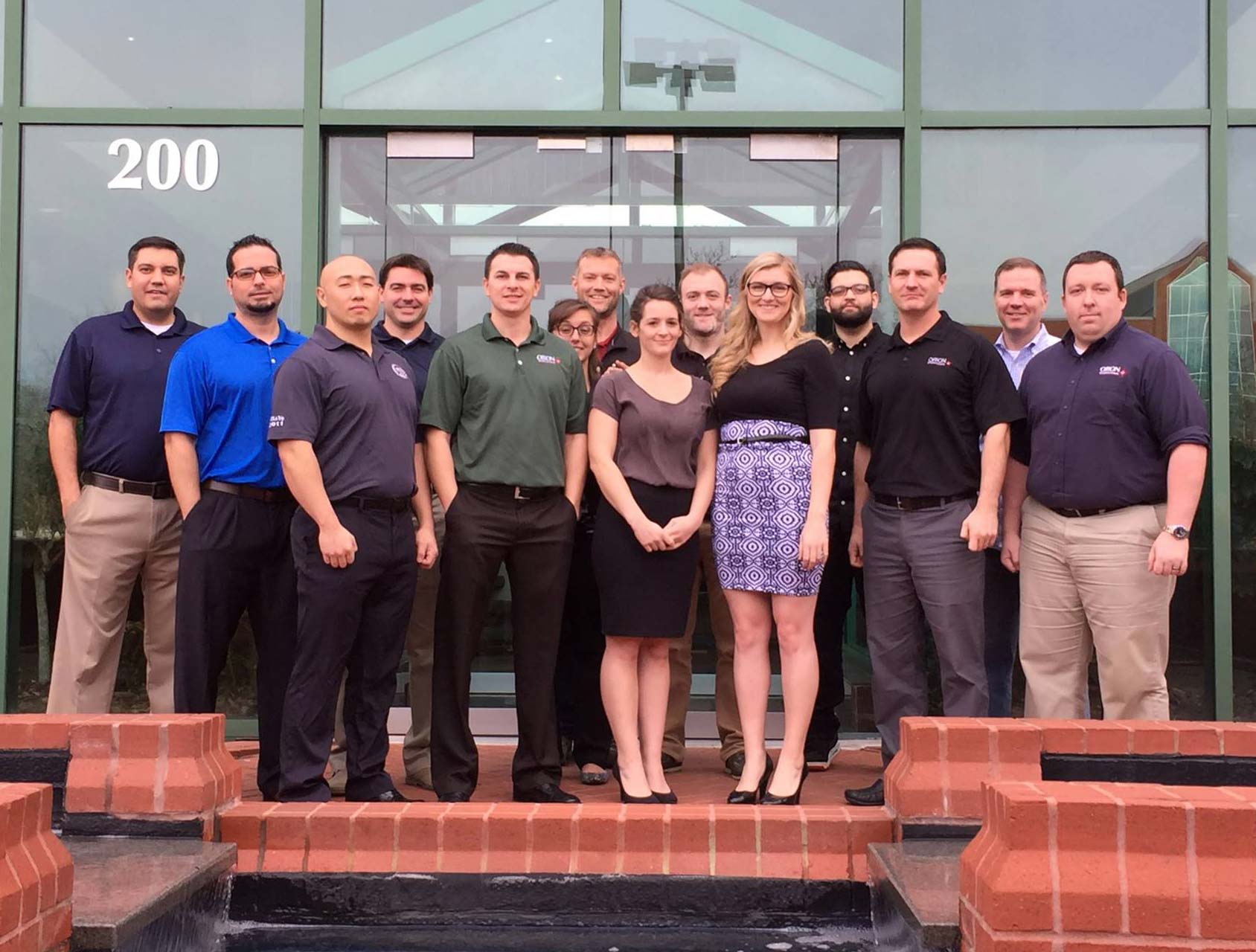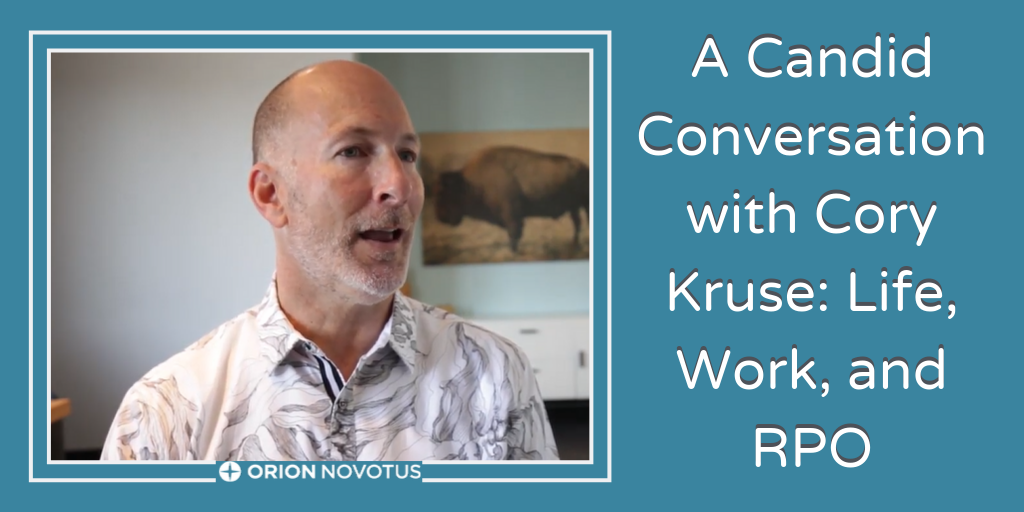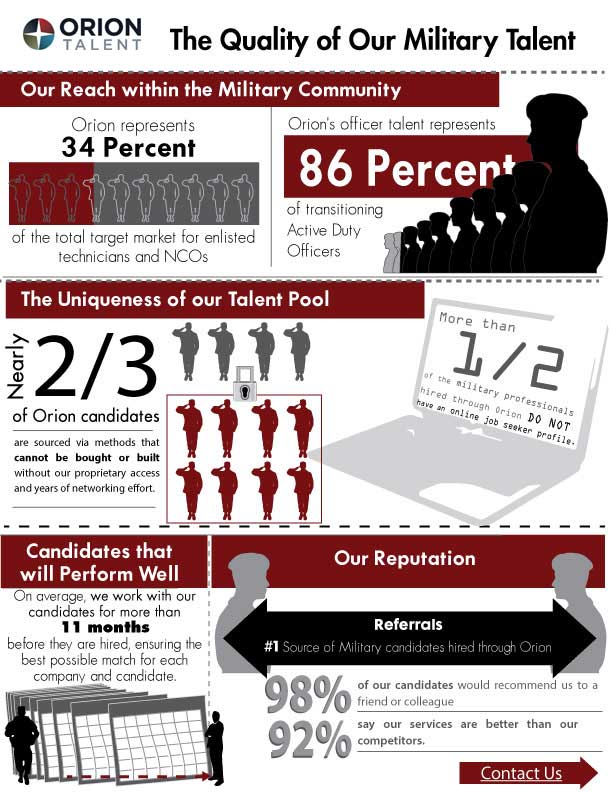Talent Insider
Wednesday, January 1, 2020
In This Issue
A Candid Conversation with Cory Kruse: Life, Work, and RPO
Four Interview Tips for Employers
7 Ways to Encourage Gratitude in the Workplace
Diversity in Action Features Orion SVP David Coe at the Data Center Austin Conference
Career Opportunities within Orion
A Candid Conversation with Cory Kruse: Life, Work, and RPO
Recruitment Process Outsourcing Association (RPOA) dives into an interview with Cory Kruse, Orion Novotus President, to discuss life, work, and the RPO industry. Cory serves as a member of the RPOA Advisory Board, and works alongside fellow RPO leaders to keep RPOA focused on achieving goals and executing the strategic plans of the association.
Cory sat down with fellow board member, Pam Verhoff of Advanced RPO, to share the good, the bad, and the ugly of RPO. Through this witty and unique interview, you will hear about….
- What is RPO? What isn’t RPO?
- What’s the difference between a staffing firm and an RPO firm?
- How’s the candidate experience different when working with a staffing firm vs an RPO firm?
- What are some of the myths and misconceptions about RPO?
-
Why do you think RPO isn’t as well known among some business & talent acquisition leaders?
Also, you will get an up close and personal look to find out what makes Cory passionate about RPO, learn about someone who has had a significant impact on his career, what he loves about his Orion Novotus team, and what he least likes about RPO.
Cory shares about what he would be doing if not leading Orion Novotus, including spending more time on his hobbies, including fishing and mountain biking. Learn all of this and much more in this interview!
Four Interview Tips for Employers
Here are four tips to keep in mind when evaluating talent through the interview process:
1. Most transitioning military personnel have never had to interview for a position. In the military, natural career progression and a demonstrated record of performance have dictated the particular jobs they secured. A different approach is often warranted, possibly including a military veteran in the interview process, as well.
2. Use your on-site or second interview to go in-depth. The second interview is your chance to closely evaluate a candidate's abilities and interpersonal skills. Look for the candidate that distinguishes himself from the other candidates and comes prepared to close the interview.
3. Shorten and define your interview schedule. The average interview process is 22 days. At Orion, however, we strive to cut that down to two weeks. You should communicate a clear timeline to the candidate, so they know what to expect. Too long of an interview process can lead to the loss of quality talent.
4. Keep your candidates updated. Regardless of whether or not they are moving on in the process, they should be notified. Our recruiters suggest a three-pronged approach: call, text, and email.
And here’s a bonus tip from Business Development Director, Dave Lehmkuhl!
Want more tips? Check out our new Employer Interview Tips webpage here. And don’t forget that Orion is here to lend our expertise to your interview process. Let us help with everything from sourcing and recruiting to onboarding, integration and retention. Learn more here.
7 Ways to Encourage Gratitude in the Workplace
Be Authentic. Obviously, gratitude is meaningless if it is not authentic. Mean what you say, or else people will sense intentions that are disingenuous.
Plan Social Activities. According to SHRM, “In a workplace where teams are increasingly important, healthy personal relationships are a key ingredient. And there’s virtually no end to the types of events HR can sponsor, so keep an open mind.” These are excellent opportunities to say thanks.
Schedule Volunteer Activities. SHRM also points out that “service projects are another opportunity to help workers cultivate closer relationships. And they’re rarely expensive to implement.” By serving others, people are more likely to show their own gratitude.
Say Thanks in a Big Way. Public recognition is motivating both for the recipient and those that witness it.
Don’t forget the people behind-the-scenes. Many offices have rockstars, and then those that do the work that supports them. As this article advises, “thank those people too, because they may not be the rockstar of the office, but they’re still an important person in the team.”
Say Thanks for the Little Things. Acknowledge small wins, as well as the bigger ones. While closing the big account is an obvious reason to celebrate, you should also thank the colleague who always makes sure there is a fresh pot of coffee.
Diversity in Action Features Orion SVP David Coe at the Data Center Austin Conference
Diversity in Action magazine recently covered the Data Center Austin Conference (DCAC) and the roles veterans play in the data center industry. Now in its fifth year, the Data Center Austin Conference brings together tech and data center professionals to solve the capacity challenges presented with an ever increasing consumption of data. The event was held in September in Austin and hosted more than 500 attendees representing more than 300 companies.
David Coe, Senior Vice President and Strategic Programs at Orion Talent and U.S. Marine Corps veteran, and Missy Young, CIO of Switch, presented a breakout session titled "Success of Military Veteran Talent in the Mission Critical Industry." The session featured a case study on Switch veteran hiring and best practices for reaching today's veteran job seekers.
Coe and Young addressed how the dramatic growth of the industry is leading to a high demand for skilled talent in roles such as engineers, project managers, technicians, and data center operators. One great source for these roles is the military.
"Military veterans have seamlessly and successfully made the transition to this industry, and companies in this space need to understand the value of this talent pool," Coe explained.
Military Hiring Conferences
Interview Junior Military Officers, Noncommissioned Officers and Enlisted Technicians Recruited for your Hiring Needs
An Orion Hiring Conference is your chance to interview the best military job seekers, selected specifically for your open positions. You will be presented with pre-screened, qualified and suitably matched veterans that are interested in your available opportunities. Click on the dates below to learn more about our upcoming hiring conferences.
West
Seattle, WA January 10
San Diego, CA January 20
South Central
Dallas, TX January 20
Midwest
Chicago, IL January 20
Northeast
Parsippany, NJ January 13
Norfolk, VA January 27
Southeast
Atlanta, GA January 21
Career Opportunities within Orion

Account Executive Careers with Orion
Orion Talent is currently seeking transitioning or former military officers with a strong record of achievement to join our Sales Team as an Account Executive. We are hiring for our San Diego, CA and Austin, TX offices.
As an Account Executive, you will be responsible for identifying and working closely with America's leading companies in order for them to hire transitioning military veterans and develop smarter hiring programs. Average total first year income for Account Executives is $80K+, with a goal of $100K+ in your second year and beyond.
To qualify, you should have military experience, a Bachelors degree, and previous sales experience or a desire to succeed in sales. You do not need prior sales experience, as we will provide you the training, tools and resources needed to succeed.
Visit our Account Executive Careers with Orion Talent page to learn more about working at Orion, including a video, podcast, and webinar on our Account Executive positions.
Once you are ready to apply, the next step is to complete an online sales assessment.
If you're looking for a quick way to introduce yourself, please send an email that includes your resume to Isabel Jessee.
Refer a Military Job Seeker or Client Company to Orion

If you would like the chance to win a $50 gift card, enter into our monthly drawings for Client referrals and Job Seeker referrals. If your referral results in a hire, you will personally receive a $100 gift card as our way of saying thank you. As always, we will maintain your privacy and never share your information nor that of your referral. That's one entry for each referral that you submit - good luck and thank you for the referral!
Melvin Thomas won the Job Seeker Referral monthly drawing
and is the winner of a $50 gift card.
Connect with Orion
Follow us to keep up-to-date on all things Orion through our social media listed below.




.png)


















